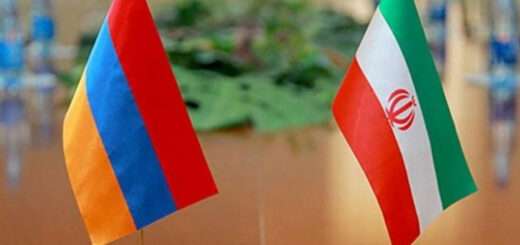Armenia, Azerbaijan Initial Peace Deal At White House

By RFE/RL’s Azerbaijani Service and
RFE/RL’s Armenian Service
The leaders of Armenia and Azerbaijan signed a US-brokered peace deal aimed at ending decades of conflict between the two countries at a ceremony hosted by US President Donald Trump at the White House.
Armenian Prime Minister Nikol Pashinian and Azerbaijani President Ilham Aliyev, seated on either side of Trump, also on August 8 signed agreements with the United States to pursue economic opportunities together.
Trump praised them as “two very smart leaders” who will go down in history for reaching the agreements and for committing themselves to a permanent peace after decades of conflict.
Promoting Peace And Prosperity
The economic agreements could set the stage for a reopening of a strategic transportation corridor across the South Caucasus that has been shut since the early 1990s.
The agreements give the US leasing rights to develop the corridor — which would run through southern Armenian territory — under the name Trump Route for International Peace and Prosperity (TRIPP).
The corridor will link Azerbaijan to its Nakhchivan exclave, which is separated from the rest of the country by an arm of Armenian territory 32 kilometers wide, and would eventually include a rail line, oil and gas lines, and fiber optic lines, allowing for the movement of goods and eventually people.
The deal does not call for the United States to pay for the construction of the transit corridor, but instead calls on private corporations to develop it. The deal was reached after a visit earlier this year by US special envoy Steve Witkoff to Baku and continued talks between the parties.
“We will turn the page of standoff, confrontation, and bloodshed and provide bright and safe future for our children. I’m very happy because today we are writing the great new history,” Aliyev said at the signing ceremony.
Added Pashinian: “Today we have reached a significant milestone in Armenia and Azerbaijani relations by laying the foundation to write a better story than the one we had in the past.”
Post-War Fence-Mending
Armenia and Azerbaijan have fought two major wars over a region known as Nagorno-Karabakh since they gained independence following the collapse of the Soviet Union in 1991.
The two South Caucasus nations have taken significant steps to mend relations since the last major armed conflict in 2020 and the subsequent exodus of the ethnic Armenian population from the disputed region that officials in Yerevan now recognize as a sovereign Azerbaijani territory.
“I feel optimistic and have positive expectations. I’ve watched the news several times, got emotional, and cried,” one woman in Armenia told RFE/RL.
“I feel sorry for all the lives we lost. [Still] I feel positive.”
Border Issues
In another diplomatic breakthrough welcomed by the international community, Armenia and Azerbaijan conducted the first-ever delimitation and demarcation of a 13-kilometer section of their northern border in spring-summer 2024.
As a result, the Armenian military withdrew from four uninhabited villages that were part of Soviet Azerbaijan before the war broke out between the two countries in the early 1990s.
Both sides agreed to continue the border delimitation and demarcation process, but over the past year no progress has been made on other sections of the border — where Armenia claims Azerbaijan continues to occupy more than 200 square kilometers of its territory.
The Armenian opposition has denounced the controversial border demarcation and further diplomatic moves by Yerevan as “capitulation,” calling for Pashinian’s resignation.
However, sustained opposition street protests and rallies that drew thousands in May and June 2024 eventually fizzled out, with the Armenian prime minister claiming that his government’s pursuit of sustainable peace with Azerbaijan still enjoys broad public support.
Transport Corridor
Under one of the clauses of the Moscow-brokered 2020 cease-fire agreement — which ended the bloody 44-day war in Nagorno-Karabakh — Armenia is to guarantee “the security of transport connections” between mainland Azerbaijan and its western exclave of Nakhichevan, ensuring “the unimpeded movement of citizens, vehicles, and cargo in both directions.”
Armenia, landlocked by Azerbaijan and Turkey, had insisted any transit route must be part of a broader regional unblocking process and must respect Armenia’s sovereignty, jurisdiction, and territorial integrity. Officials in Yerevan had rejected the idea and even the narrative of an extraterritorial corridor, calling it a veiled territorial claim by Azerbaijan.
In 2024, unable to reach a common solution, Azerbaijan and Armenia indicated that the connectivity issue would be handled separately from the broader peace agreement.
According to the 2020 cease-fire agreement, control over transport links between Armenia and Azerbaijan was to be exercised by Russia’s FSB Border Guard Service.
However, following a series of events — including the failure of Russian peacekeepers to protect the region’s ethnic Armenian population during Azerbaijan’s offensive in September 2023 and their subsequent withdrawal — Armenia has shifted its geopolitical orientation, distancing itself from Moscow and aligning more closely with the West.
A Role For The United States
The talk about possible US involvement in the administration of the road as part of a solution to the lingering dispute emerged around the time of the July 10 summit between Pashinian and Aliyev in Abu Dhabi, where five-hour talks purportedly also focused on connectivity issues.
The US ambassador to Turkey, Thomas Barrack, in particular, indicated that Washington proposed a 100-year lease on such a transport link in a bid to facilitate a peace deal between the two South Caucasus nations.
“They [Armenia and Azerbaijan] are arguing over 32 kilometers of road, but this is no joke,” Barrack told reportersin New York on July 11. “It’s been going on for a decade — 32 kilometers of road.”
Reaction From Regional Players
Sustainable peace and the opening of a transit route through Armenia has the potential to link the oil- and gas-rich Caucasus and Central Asia to Europe, bypassing Russia and Iran.
Both Russia and Iran have expressed concern about a potential US presence in Armenia’s strategic Syunik region, bordering Iran.
Moscow has accused Washington of trying to hijack the Armenian-Azerbaijani peace process and sideline regional powers.
“The Westerners aim to transfer the reconciliation process of Baku and Yerevan to their tracks,” Maria Zakharova, a spokeswoman for the Russian Foreign Ministry, said at a news briefing on July 24. “We also know where these tracks usually lead…. This can lead to an imbalance of the security system in the region.”
Iran has also voiced strong opposition to any deal that it believes could jeopardize its northern border with Armenia.
A top adviser to Iran’s Supreme Leader Ayatollah Ali Khamenei has warned countries “in or outside the region” to stop seeking a land corridor for Azerbaijan that would pass through an Armenian region bordering the Islamic republic.





